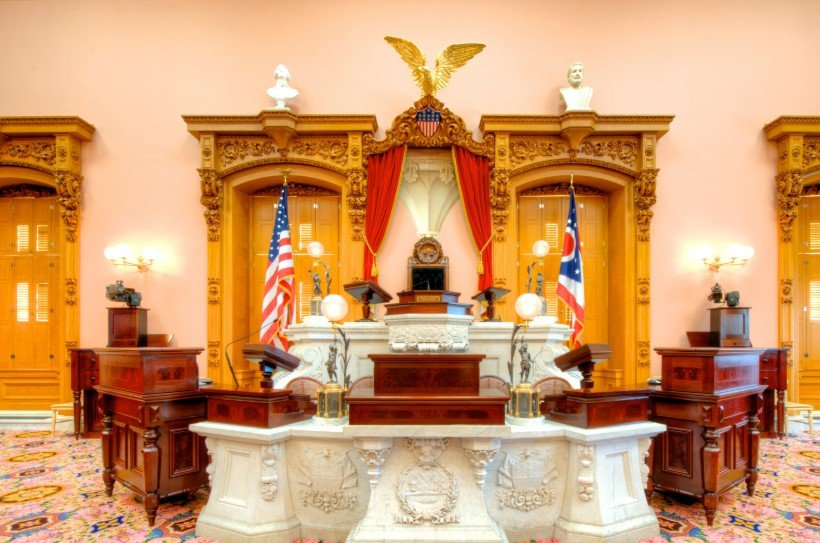Bill Advances to Governor’s Desk After Contentious Debate
In a highly charged, marathon session, Ohio lawmakers passed a bill that is set to spark intense debate across the state. House Bill 8, known by its proponents as the “Parents’ Bill of Rights,” is on its way to Governor Mike DeWine’s desk. The bill combines two major provisions: mandatory religious release time for public school students and a requirement for educators to inform parents if a student requests to be identified as a gender different from their sex at birth.
The Ohio Senate voted 24-7 in favor of the bill, and the Ohio House concurred with a 57-31 vote, sealing its fate before reaching the governor. The law is expected to face strong opposition, especially from those who see it as an infringement on LGBTQ+ rights and religious freedom.
Parents’ Rights or Potential Overreach?
Supporters of the bill, including its sponsors State Reps. D.J. Swearingen and Sara Carruthers, argue that it strengthens the relationship between parents and children by ensuring parental involvement in decisions regarding a child’s sexuality and education. Swearingen stressed the importance of keeping parents informed about sensitive educational content, saying, “What we’re trying to do with the ‘Parents’ Bill of Rights’ is to preserve that critical relationship between a parent and their child in the school system.”

Under the bill, public schools would be required to inform parents in advance if any sexual education content will be taught, allowing them to opt-out of lessons if they wish. Moreover, it bans any form of sexuality education for children in kindergarten through third grade, restricting “oral or written instruction, presentation, image, or description of sexual concepts of gender ideology.”
But for many, the bill’s mandatory outing provision and its inclusion of religious instruction during school hours are far more contentious.
Religious Release Time: A New Mandate
One of the more controversial amendments to H.B. 8 is the religious release time provision. Currently, Ohio law allows school districts to permit students to leave for religious instruction during the school day, but it is not mandatory. The bill changes the language from “may” to “shall,” effectively making religious release time a required policy for all Ohio school districts.
The release time provision has its roots in a 1952 U.S. Supreme Court decision, Zorach v. Clauson, which upheld the practice of students leaving school for religious instruction as long as it met certain criteria. Under H.B. 8, the instruction must take place off school grounds, be privately funded, and require parental consent.
Some school districts, like Westerville and Worthington, have recently revoked their religious release time policies, largely due to concerns over the separation of church and state. Still, LifeWise Academy, a Hilliard-based religious organization, continues to grow rapidly, enrolling students from more than 160 Ohio school districts in its Bible-based program.
In response to concerns, the bill includes several amendments aimed at ensuring the safety of students. These include background checks for any religious release time instructors and volunteers, a step requested by Ohio House Speaker Jason Stephens.
The Political Divide
The debate surrounding H.B. 8 reveals a significant political divide in Ohio. On the Senate floor, the bill sparked an hour-long discussion. While most Republicans supported the measure, there were notable exceptions. State Senator Louis W. Blessing, III, R-Colerain Township, was the only Republican to vote against the bill. Blessing expressed concerns that the law could lead to unintended legal challenges, citing previous cases where state laws, such as abortion restrictions, faced setbacks in court or through voter referenda.
“I fear that a similar dynamic is at play,” Blessing said. “That we wind up with a spinning review from the courts to the ballot or both.”
Others, like State Senator Andrew Brenner, R-Delaware, remained firm in their support, emphasizing that parents have the fundamental right to make decisions regarding their children’s education and well-being. Brenner argued that parents should be notified if a child requests to be recognized as a different gender than the one assigned at birth.
However, Democrats like State Senator Bill DeMora, D-Columbus, were critical of the bill, calling it harmful to students and families, particularly in its treatment of LGBTQ+ youth. “H.B. 8 has no redeeming qualities,” DeMora said, condemning the bill for what he sees as an attack on personal freedoms.
Legal and Social Implications
If Governor DeWine signs the bill into law, it will likely face legal challenges. Opponents argue that it violates the constitutional separation of church and state and infringes on the rights of LGBTQ+ students. Many fear the law will create an environment where LGBTQ+ children are outed without their consent, leading to potential harm from family members or peers.
The forced outing provision, in particular, has sparked widespread concern among LGBTQ+ advocates, who argue that it puts vulnerable students at risk. In contrast, supporters claim the bill helps ensure that parents remain informed and involved in their children’s lives.
With the bill’s passage, Ohio joins a growing number of states that have introduced similar legislation aimed at limiting LGBTQ+ rights in schools. How this law will play out in the courts and in communities remains to be seen.

Comments